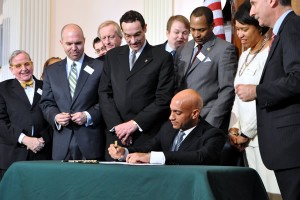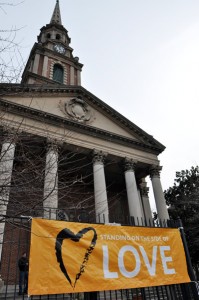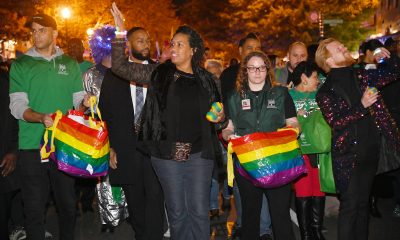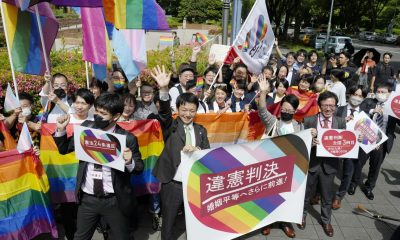Local
An early holiday gift for city’s gay couples
With about 200 spectators cheering from the pews, D.C. Mayor Adrian Fenty signed a bill last week to legalize same-sex marriage in Washington during a ceremony at a church that played a leading role in pushing for black civil rights in the 1950s and 1960s.
“To the world, today an era of struggle ends for thousands of residents of Washington, D.C., who have been denied the fundamental right to marry the person of their choosing,” Fenty told the gathering at All Souls Unitarian Church in Northwest D.C.
“I say to all those residents who watch the nation’s capital today that our city is taking a leap forward in ensuring freedom and equality to all residents.”
Fenty signed the Religious Freedom & Civil Marriage Equality Amendment Act of 2009 four days after the D.C. Council gave its final approval of the measure, 11-2.
The signing also came five months after a separate bill passed by the Council and signed by Fenty, which recognizes same-sex marriages performed in other jurisdictions, became law after clearing its required congressional review.
The measure that Fenty signed Friday was expected to be sent to Capitol Hill this week, where it, too, must undergo a congressional review of 30 legislative days. Most congressional observers expect the Democratic controlled Congress will allow the bill to become law by taking no legislative action to overturn it.
“The signing of this bill marks a watershed moment for human rights in the District of Columbia,” said Rev. Robert Hardies, pastor of All Souls Unitarian Church and one of the leaders of a coalition of D.C. clergy members who support same-sex marriage equality.
“I and the nearly 200 D.C. clergy who supported this bill look forward to celebrating the marriages of loving lesbian and gay couples in sanctuaries like this one all over our city,” he said.
Among those standing behind Fenty as he signed the bill at a table set up in front of the church alter were D.C. Council Chair Vincent Gray (D-At Large); gay Council member David Catania (I-At Large), author and lead sponsor of the bill; and Council member Phil Mendelson (D-At Large), chair of the committee that shepherded the bill through the Council.
Also standing at the table for the signing were gay Council member Jim Graham (D-Ward 1), in whose ward the church is located; Council members Jack Evans (D-Ward 1); Muriel Bowser (D-Ward 4), and Harry Thomas Jr. (D-Ward 5); and Fenty’s LGBT Affairs Office director, Christopher Dyer.
Fenty and Catania, among others participating in the bill signing ceremony, said the decision to hold the event in a church was symbolic of the message they sought to project during the campaign to legalize same-sex marriage in the city: that the legislation would not infringe on the rights of people of faith and would, in fact, give ministers supportive of marriage equality the right to legally perform same-sex marriages.
Most of the opposition to the legislation was led by clergy who oppose same-sex marriage on religious grounds. Bishop Harry Jackson, pastor of Hope Christian Church in Beltsville, Md., and the lead spokesperson for the bill’s opponents, has vowed to continue efforts to urge Congress to overturn the legislation.
Jackson and his supporters also are appealing in D.C. Superior Court a ruling by the city’s election board denying a proposed voter initiative that sought to ban same-sex marriage in the District of Columbia.
Catania told people gathered for the bill’s signing that six generations of his family, including his grandfather, have been Baptist ministers. He noted that leaders of the churches in which his ancestors were a part were outspoken abolitionists in the fight against slavery prior to the Civil War.
“I was raised in a household that loved this country,” he said. “And at times, even in our struggles, we wonder whether our best days are behind us. I have to be completely honest with you. I’ve never been more certain in my life that our best days are before us.”
Catania said the passage and signing of a same-sex marriage bill was the culmination of years of work from committed LGBT activists and their allies, beginning with veteran D.C. gay activist Frank Kameny, who is credited with founding the local LGBT rights movement in the early 1960s.
“I was fortunate enough to simply guide the process and draft [the bill], but it would not have taken place without the extraordinary leadership of Phil Mendelson on the Judiciary Committee and our non-stop support from our [Council] chairman. And enough cannot be said about the rank and file members of this Council, who stood with us.”
Sources familiar with the mayor’s office said Fenty also considered holding the signing ceremony at Covenant Baptist church in
Southeast D.C., which is headed by pro-same-sex marriage pastors Dennis and Christine Wiley. The Wileys, along with Hardies of All Souls, were co-chairs of the coalition of clergy backing same-sex marriage. One source, speaking on condition of anonymity, said Fenty is thought to have chosen All Souls in part because it’s located in the neighborhood where he grew up.
In his remarks, Fenty introduced his parents, who were in the audience, and noted that their status as an interracial couple made them a part of the marriage equality movement.
“My parents know a little something about marriage equality,” he said. “They married almost 40 years ago and in a country at the time where every jurisdiction didn’t agree that an interracial couple should be married. Had they not been able to, I would not be standing here as mayor of the District of Columbia right now.”
Graham, who, along with Catania, has been a longtime LGBT rights advocate, appeared to express the emotion that many LGBT activists and same-sex couples present at the bill signing event shared.
“Thank God for this day,” he said. “Thank God that I was able to live to see this day.”
Graham praised Fenty for standing out as a “certainty” that the bill would be signed whenever the Council felt the time was right to pass it.
He also pointed to the historic support All Souls Unitarian Church provided for the African American civil rights movement in the 1950s, when the church founded one of the city’s first integrated youth clubs. It was at a time when D.C.’s youth recreation facilities were segregated among black and whites.
“We can’t overlook how fitting it is that we are in this church,” he said, “because this church has a great tradition of fighting for civil rights and human rights.”
Fenty, Catania and Graham were beseeched after the ceremony by activists and same-sex couples attending the event who asked them to pose for pictures with them and to sign copies of a mayoral press statement announcing the bill signing.
“It’s an exciting day for many of us,” said gay Democratic activist Peter Rosenstein, one of the organizers of the same-sex marriage advocacy group Campaign for All D.C. Families. “It’s a day that many of us thought wouldn’t come in our lifetimes. It’s for us and for future generations.”
Michael Crawford, co-chair of D.C. for Marriage, said he doesn’t believe Fenty and the 11 Council members who voted for the bill would face serious opposition in their upcoming elections over this specific issue.
“The folks who are claiming they will enact political retribution against Council members that voted for marriage equality, by and large, don’t live in the District,” he said. “So it’s going to be pretty difficult for them to have an impact on District elections.”
Rev. Abena McCray, pastor of D.C.’s LGBT welcoming Unity Fellowship Church, and Bishop Rainey Cheeks, pastor of the city’s Inner Light Ministries, which also has a largely LGBT congregation, each said the mayor’s signing of the marriage bill would boost the faith and morale of LGBT people of faith.
“I don’t anticipate a backlash,” McCray said, when asked about clergy who have opposed the bill.
“God is in control,” she said. “God spoke today. History was made. And we’re going to move forward in only one thing, and that’s love.”
Cheeks said he expects efforts by people of faith to fight the legislation will be diminished once they understand it.
“When they really understand that this law does not take away anything from anybody, it adds to,” they will be far less likely to try to reverse the law, he said.
“Every church and every denomination already has the right to say no to whomever they want to say no to,” Cheeks said, on the question of performing same-sex marriages. “It simply expands the right for us to be able to do what we need to do.”
District of Columbia
Two charged with assaulting, robbing gay man at D.C. CVS store
Incident occurred after suspects, victim ‘exchanged words’ at bar

D.C. police just after 1 a.m. on April 10 arrested two men for allegedly assaulting and robbing a gay man inside a CVS store at 1418 P St., N.W., according to a police report and charging documents filed in D.C. Superior Court.
The charging documents state that the alleged assault and robbery occurred a short time after the three men “exchanged words” at the gay bar Number 9, which is located across the street from the CVS.
The arrested men are identified in the charging documents as Marquel Jose Diaz, 27, of Northwest D.C., and Lorenzo Jesse Scafidi, 21, of Elizabeth City, N.C. An affidavit in support of the arrest for Diaz says Diaz and the victim “were previously in a relationship for a year.”
Court records show Diaz was charged with Simple Assault, Theft Second Degree, and Possession of a Controlled Substance. The court records show the controlled substance charge was filed by police after Diaz was found to be in possession of a powdered substance that tested positive for cocaine.
Scafidi was charged with Simple Assault and Theft Second Degree, the court records show.
The D.C. police report for the incident does not list it as a suspected hate crime.
The court records show both men pleaded not guilty to the charges against them at a Superior Court arraignment on the day of their arrest on April 10. The records show they were released by a judge while awaiting trial with an order that they “stay away” from the victim. They are scheduled to return to court for a status hearing on May 21.
The separate police-filed affidavits in support of the arrests of both Diaz and Scafidi each state that the two men and the victim “exchanged words” inside the Number 9 bar. The two documents state that both men then entered the CVS store after the victim went to the store a short time earlier.
Scafidi “came into the CVS shortly after and entered the candy aisle and slammed Complainant 1 [the victim] to the ground causing Complainant 1’s phone to fall out of CP-1’s pocket,” one of the two affidavits says. It says Scafidi “again picked up CP-1 and slammed him to the ground.”
The affidavit in support of Diaz’s arrest says Diaz also followed the victim to the CVS store after words were exchanged at the bar. It says that after Scafidi allegedly knocked the victim down in the candy aisle Diaz picked up the victim’s phone, “swung on” the victim “while he was still on the ground,” and picked up the victim’s watch before he and Scafidi fled the scene.
Without saying why, the two arrest affidavits say Diaz and Scafidi returned to the scene and were arrested by police after the victim and at least one witness identified them as having assaulted and robbed the victim.
Attorneys representing the two arrested men did not respond to phone messages from the Washington Blade seeking comment and asking whether their clients dispute the allegations against them.
The victim also did not respond to attempts by the Blade to obtain a comment from him. The police report says the victim is a resident of Fairfax, Va.
District of Columbia
Bowser calls for ‘extraordinary’ response to reduction in D.C. budget
Impact on city funding for LGBTQ programs and grants unclear

D.C. Mayor Muriel Bowser on April 15 issued an executive order calling for “extraordinary actions,” including “significant cuts in District Government services,” to address a decision by Congress to cut the city’s current budget by $1.1 billion.
The nine-page executive order points out that these actions became necessary after the U.S. House of Representatives has so far declined to vote on a free-standing bill approved by the U.S. Senate last month that would restore the $1.1 billion D.C. budget cut initially approved by the House.
In addition to large-scale cuts in city services, the mayoral order says the congressionally imposed city budget cut will bring about city “hiring freezes, financial impacts to employees, reductions and terminations in contracts and grants, and closures of District Government facilities.”
The order adds, “These are unprecedented actions given that the District itself adopted and is able to implement a fully balanced budget, but they are necessary due to the Congressional cut to the District’s budget and its inaction in timely fixing its legislative error.”
The House adjourned this week on a recess until the end of April, and congressional observers say it is unclear whether the majority Republican House will take up the Senate bill to undo the D.C. budget cut when the House returns from its recess. President Donald Trump has called on the House to approve the bill to restore the full D.C. budget.
Among the D.C. LGBTQ organizations and those providing services to the LGBTQ community that receive D.C. government funding and that could be impacted by the budget cuts are Capital Pride Alliance, which is organizing WorldPride 2025 set to take place in D.C. next month; and Whitman-Walker Health, one of the city’s largest private healthcare organizations that provides medical services for LGBTQ clients.
Also receiving city funding are the Wanda Alston Foundation, which provides housing services for LGBTQ people; and the LGBTQ youth advocacy and services organization SMYAL.
Spokespersons for the four organizations couldn’t immediately be reached to determine if they knew whether the soon-to-be implemented budget cuts would have an impact on the city funding they currently receive.
In response to questions from news reporters during an April 15 press conference call to discuss the Bowser executive order, Jenny Reed, director of the D.C. Office of Budget and Performance Management, said details on specific programs or funding allocations set to be cut would not be known until the mayor submits to the D.C. Council her Supplemental FY 2025 budget along with her proposed FY 2026 budget.
Reed was joined at the press briefing by Lindsey Parker, Mayor Bowser’s chief of staff; and Tomas Talamante, director of the Office of Intergovernmental Affairs.
They and other city officials have said the impact of the congressionally imposed city budget cut was expected to be lessened but remain highly problematic by Bowser’s decision to invoke a 2009 law that allows the city to increase its own spending without approval by Congress under certain circumstances.
The mayor has said under that law, the city would need to cut its FY 2025 budget by $410 million rather than by $1.1 billion. It couldn’t immediately be determined whether House Republicans, who initiated the requirement that the D.C. budget be cut by $1.1 billion, would challenge the mayor’s plan to invoke the 2009 law to reduce the size of the budget cut.
“Without the ability to fully execute the Fiscal Year 2025 budget as adopted and approved by the District, this gap will force reductions in critical services provided by our largest agencies, including the Metropolitan Police Department and the Fire and Emergency Medical Services Department,” the mayor’s executive order states.
“The District will continue to work with members of the House of Representatives to urge them to vote to fully restore the District’s Fiscal year 2025 budget and will continue to work with President Trump to strongly encourage the House of Representatives to take that action,” the order says.
District of Columbia
LGBTQ budget advocates fight for D.C. resources in a tough fiscal year
‘Trying to preserve life-saving services’ amid $1 billion cut

The months and days leading up to June are especially busy for LGBTQ Washingtonians. For one group, the DC LGBT Budget Coalition, which works year-round to ensure LGBTQ residents are represented and financially supported by the D.C. government, this time of year is their Super Bowl. Beginning in April, the D.C. Council and Mayor’s Office hold budget hearings for the next fiscal year.
With D.C.’s budget now under review, the Washington Blade spoke with Heidi Ellis, coordinator of the DC LGBT Budget Coalition, about the group’s top priorities and their push to ensure continued support for queer communities.
“The LGBTQ Budget Coalition was founded in 2020 at the height of the pandemic, as a way for the community to work together to advocate for key funding and policy changes,” Ellis said. “We recognized we were stronger together. A lot of groups are often pitted against each other for resources and dollars. This coalition was founded out of a need for unity. Since then, we’ve successfully advocated for more than $20 million in dedicated LGBTQ investments.”
In addition to coordinating the coalition, Ellis is the founder and CEO of HME Consulting & Advocacy, a firm that helps build coalitions and advance policy initiatives that address intersectional issues in the LGBTQ community. One of its most powerful tools, she explained, is direct outreach through community surveys.
“We actually do community surveys to see what people need and what’s top of mind,” Ellis said. “Of course, we also pay attention to the broader political landscape — like the current threats to HIV funding. That helps us prioritize.”
Because the coalition is comprised of more than 20 organizations across various sectors —healthcare, housing, community organizing — Ellis said its diversity enables it to connect grassroots needs to potential policy solutions.
“Our coalition includes service providers, community groups, health and housing advocates-folks who are deeply plugged into what’s happening on the ground,” she said. “They help determine our direction. We know we don’t represent every queer person in D.C., but our coalition reflects a wide range of identities and experiences.”
The insights gathered through those surveys ultimately inform the coalition’s annual budget proposal, which is submitted to the Council and mayor.
“That’s how we got to our FY26 priorities,” she said. “This year, more than ever, we’re fighting to protect what we’ve already secured — funding and policies we’ve had to fight for in the past. We know there’s concern around this budget.”
One of the challenges this year is that the D.C. government’s operating budget and some of its legislation must be approved by Congress. With a projected decline in tax revenue and a Republican-controlled Congress that has historically opposed LGBTQ funding, the Coalition has had to think strategically.
“Even before the situation on the Hill, the CFO projected lower revenue,” Ellis said. “That meant cuts to social programs were already coming. And now, with the $1 billion slashed from D.C.’s budget due to the continuing resolution, we’re not only fighting for D.C.’s budget and autonomy, but also trying to preserve life-saving services. Our message is simple: Don’t forget about queer people.”
This year’s proposal doesn’t include specific dollar figures. Instead, the Coalition outlines five funding priority areas: Healthcare, Employment & Economic Equity, Housing, Safety & Community Support, and Civil Rights.
Why no exact amounts? Ellis said it’s because not all solutions are financial.
“Some of our asks don’t require new funding. Others build on existing programs-we’re asking whether the current use of funds is the most effective. We’re also proposing policy changes that wouldn’t cost extra but could make a real difference. It’s about using what we have better,” she said.
When drafting the proposal, the Coalition tries to prioritize those with the most pressing and intersecting needs.
“Our perspective is: If we advocate for the most vulnerable, others benefit too,” Ellis said. “Take LGBTQ seniors. Some may have done well in life but now face housing insecurity or struggle to access affordable healthcare. Many in our coalition are elders who fought on the frontlines during the AIDS epidemic. They bring critical historical context and remind us that Black and brown communities bore the brunt of that crisis.”
“I love our coalition because it keeps us accountable to the moment,” she added. “If we center those most marginalized, we can make an impact that lifts everyone.”
In addition to healthcare and housing, safety remains a top concern. The Coalition has fought to maintain funding for the Violence Prevention and Response Team (VPART), a city-supported group that includes MPD, community-based organizations, and the Mayor’s Office of LGBTQ Affairs. VPART responds to crimes affecting the LGBTQ community and connects victims to legal, healthcare, and housing services.
“We’ve pushed to make VPART more proactive, not just reactive,” Ellis said. “The funding we’ve secured has helped survivors get the support they need. Cutting that funding now would undo progress we’re just beginning to see.”
At the end of the day, Ellis emphasized that this process is about far more than spreadsheets.
“A budget is a moral document,” she said. “If we’re not represented, you’re telling us our lives don’t matter at a time when we need protection the most. When people can’t get food, medicine, housing — that has a devastating impact. These are vital services.”
The DC LGBT Budget Coalition is urging residents to support a letter-writing campaign to D.C. Council members and the mayor. You can send a letter here: https://actionnetwork.org/letters/fully-fund-dcs-lgbtq-communities
Read the full FY26 budget proposal here: https://drive.google.com/file/d/1bTrENnc4ZazJTO6LPrQ3lZkF02QNIIf1/view
-

 The White House5 days ago
The White House5 days agoWhite House does not ‘respond’ to reporters’ requests with pronouns included
-

 Arts & Entertainment5 days ago
Arts & Entertainment5 days ago‘Gay is Good’ Pride Pils Can Celebrates Frank Kameny’s 100th Birthday for WorldPride in D.C.
-

 District of Columbia2 days ago
District of Columbia2 days agoReenactment of 1965 gay rights protest at White House set for April 17
-

 Hungary2 days ago
Hungary2 days agoHungarian MPs amend constitution to ban public LGBTQ events















